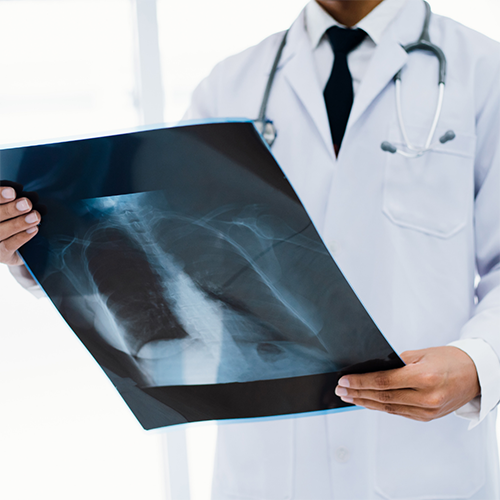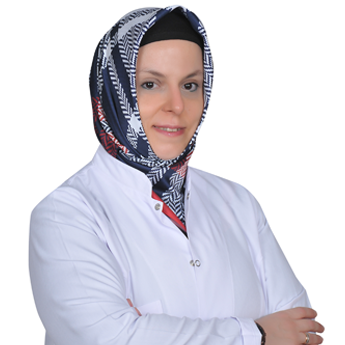CHEST DISEASES

Pulmonary diseases is a branch of science dealing with the diagnosis and treatment of diseases occurring in the lung and respiratory system. Many diseases such as asthma, allergic diseases, bronchitis, chronic obstructive pulmonary disease, pneumonia, tuberculosis, pulmonary embolism, chronic cough, lung cancer, respiratory disorders during sleep, smoking-related diseases are treated. Chest physicians work with a multidisciplinary approach during the treatment process and are in consultation with other units when necessary.
When necessary for diagnosis and treatment, many different techniques such as advanced radiological imaging examinations, laboratory tests, forced vital capacity test in pulmonary function laboratory, diffusion test are used. Specialised physicians who diagnose and treat diseases related to chest diseases also help their patients about smoking addiction, smoking-related diseases and smoking cessation methods.
Which Diseases are Diagnosed and Treated in Chest Diseases Department?
In Chest Diseases, diagnosis and treatment of respiratory and lung-related diseases are performed. Patients are treated by the specialised physicians of the department with outpatient follow-up or inpatient treatment when necessary. Physicians who use laboratory and radiological examinations for the diagnosis of respiratory system problems among chest diseases, perform many diagnostic procedures such as intraoral pressure measurements, lung volume tests, diffusion test, reversibility test, slow vital capacity test and forced vital capacity test in the pulmonary function laboratory among the department laboratories. It works in coordination with other department physicians for methods such as skin test application in disorders caused by allergic causes. Pulmonology specialists deal with the diagnosis and treatment of diseases in the sleep laboratory for the diagnosis and treatment of sleep disorders that develop due to breathing, as well as in the bronchoscopy unit where advanced imaging services are provided.
Chronic Obstructive Pulmonary Disease (COPD) is a condition that includes emphysema and chronic bronchitis. This disease, which reduces the quality of life of the individual and causes breathing difficulties even during daily activities, is also a progressive chronic disease with cough and sputum.
Lung cancer is caused by uncontrolled and rapid proliferation of lung cells. Chemotherapy, radiotherapy, immunotherapy and surgery methods are used in the treatment of the disease that causes complaints of bloody sputum, shortness of breath and chest pain.
There is a natural connection between asthma and allergic lung diseases and allergy. As a result of the entry of any allergen into the body, which the immune system sees as a threat, narrowing of the airways, increased mucus production, cough and wheezing appear.
Chronic coughs are coughs that last longer than 3 weeks, reduce sleep quality, cause fatigue and reduce the quality of life of the person. The cause of chronic coughs, which can often be a symptom of a more serious disease, should be determined and treatment should be carried out without delay.
Pneumonia (Pneumonia) The development of infection in the lungs due to bacteria, viruses or fungi is known as pneumonia (pneumonia). The infection fills the air-filled sacs called alveoli and difficulty in breathing begins. Pneumonia, which manifests itself with fever, cough, sweating, chest pain, chills and even shortness of breath, should be treated immediately.
Pneumothorax can occur as a result of another disease or during medical intervention. In some cases, it is also observed to occur for no reason. Symptoms of chest pain, cough and shortness of breath should be treated urgently.
Pulmonary embolism (pulmonary embolism), a blood clot that forms in different parts of the body and can reach the lung through the bloodstream, can block other vessels, especially the pulmonary artery. Symptoms include chest pain, sweating, palpitations, bloody sputum and shortness of breath.
Sarcoidosis is a systemic disease caused by abnormal functioning of the immune system, affecting the heart, liver, spleen, brain, eyes, lymph nodes and especially the lung. The exact cause of this non-contagious disease is unclear. Diagnosis of the disease requires blood and urine analyses, chest x-ray and lung tomography.
Pleurisy is the filling of the space between the lung membranes with more fluid than it should be due to various reasons. Pleurisy should be considered as a symptom of a different disease rather than a disease in itself. Diseases such as tuberculosis, lung cancer, pleural cancer, lung abscess and pneumonia can cause fluid accumulation.
Smoking Related Diseases and Quitting Methods: Although smoking has many effects on human health, the main area where the most serious consequences are seen is the chest area. Therefore, in the chest diseases unit, smoking-induced





